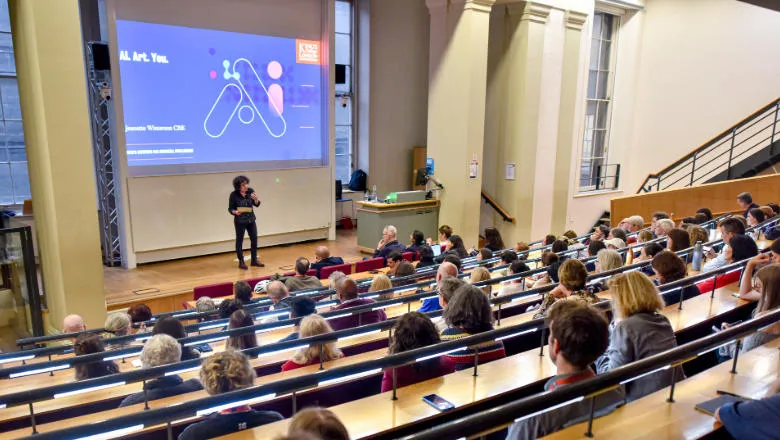
Professor Sylvie Delacroix
Director of the Centre for Data Futures
- Inaugural Jeff Price Chair in Digital Law
Contact details
Biography
Sylvie Delacroix is the Inaugural Jeff Price Chair in Digital Law. She is also the director of the Centre for Data Futures and a visiting professor at Tohoku University. Her research focuses on the role played by habit within ethical agency, the social sustainability of the data ecosystem that makes generative AI possible and bottom-up data empowerment. The latter work led to the first data trusts pilots worldwide being launched in 2022 in the context of the Data Trusts initiative www.datatrusts.uk.
The public policy dimensions of her work have led her to being invited to contribute to multiple policy initiatives. She has also acted as an expert for public bodies, and served on the Public Policy Commission on the use of algorithms in the justice system (Law Society of England and Wales).
Her current work on agency-enhancing, participatory infrastructure and the communication of uncertainty in the context of LLMs deployed in morally-loaded contexts is funded by the Patrick J. McGovern Foundation. Previously, Professor Delacroix's work has been funded by the Wellcome Trust, the NHS, Omidyar Network, Mozilla Foundation, and the Leverhulme Trust, from whom she received the Leverhulme Prize. Her latest book Habitual Ethics? was published by Bloomsbury in 2022 (open-access). She was made a Montgomery Fellow (Dartmouth College) in 2025.
Research Interests
Sylvie's research focuses on agency, broadly construed. The different strands of her research all seek to unearth the factors that can compromise our capacity to question the way things are and project ourselves into the future. This question often brings her right at the intersection between law and ethics.
Sometimes her interest in agency does not intersect with law as such, but rather with the ambient, data-intensive technologies we have become so reliant on. In a series of recent publications, she questions the logic underlying the optimisation tools at the heart of these data-intensive technologies. When the foods we eat, the people we meet and the books we read are all streamlined according to the traits and desires inferred from our past behaviour, have we gained a greater degree of agency?
In a distinct, but related vein, her work on Machine learning interpretability calls for the introduction of ‘ensemble contestability features’. This work underlies a concrete, cross-disciplinary project that compares concrete ways of incentivising contestability for ML systems deployed in ethically or legally significant contexts.
At other times her interest in agency is (almost) self-contained. While Habitual Ethics? investigates the non-deliberative underpinnings of ethical agency, a publication on Turing on Lovelace looks at the relationship between agency, originality and surprise. Habitual Ethics has been the subject of a book symposium in Jurisprudence with reviews by Gerald Postema, Mario De Caro and Sarah Fine, as well as a reply to these reviews. Its cross-disciplinary significance is illustrated by the fact that it also been reviewed in journals such as The British Journal of General Practice.
Sometimes her interest in agency leads her to put forward novel legal mechanisms. The data trusts framework developed with Neil Lawrence is meant to complement top-down regulation. As bottom-up empowerment mechanisms (pilots here), data trusts enable groups to pool together the rights they have over their data and task an intermediary – the data trustee - to leverage those rights. The data trustee may then be in a position to obtain better terms and conditions with service providers and/or monitor data sharing agreements.
Sometimes her interest in agency leads her to criticise existing legal frameworks. Her article on professional responsibility (OJLS) for instance criticises the courts’ delineation of obligations meant to address lay vulnerability: the perduring focus on knowledge asymmetry misses the extent to which the vulnerability at stake has to do with a patient’s / client’s / pupil’s ongoing ability to (re)construct their ‘sense of self’.
You can find more information about Sylvie and her work at https://delacroix.uk/
Connect with her on LinkedIn: prof-sylvie-delacroix.
Teaching Interests
- Philosophy of Law
- Legal Theory
- Philosophy and AI, data-related themes
PhD supervisions
Sylvie is accepting PhD applications that focus on either large language models and the communication of unquantifiable uncertainty or on the role of habit within our ethical lives
Publications
Please refer to Sylvie's website for a comprehensive list of publications.
Research

Centre for Data Futures
Bringing together interdisciplinary experts to focus on participatory infrastructure throughout the life of data-reliant tools.

KingsCAT: Capture and Analysis Tool for Social Media Research at King’s College London
KingsCAT is an instance of the open source 4CAT: Capture and Analysis Toolkit set up to support interdisciplinary and collaborative social media research.
Project status: Ongoing
News
New research highlights critical moment for shaping AI use in primary care
New interdisciplinary research involving Professor Sylvie Delacroix sets out why the next few years are crucial for shaping how artificial intelligence is...

New Data Empowerment Clinic launches to tackle 'missing profession' of the 21st Century
The first dedicated educational infrastructure of its kind, the Clinic will support grassroots data empowerment movements globally and enable students to gain...

Experts come together to discuss the future of artificial intelligence in education
The Centre for Data Futures brought policymakers, practitioners and cultural leaders from the fields of AI and education to discuss how AI can deepen...
Professor Sylvie Delacroix awarded prestigious Montgomery Fellowship at Dartmouth College
Professor Delacroix will join three other experts on the Montgomery Fellows Program whose work covers language, freedom of expression, and agency in relation...

Centre for Data Futures secures prestigious Patrick J. McGovern Foundation grant funding
Following a successful grant application, King’s Centre for Data Futures has been awarded philanthropic funding to establish a Data Empowerment Clinic and...

Return of five-day Festival of Artificial Intelligence sees over 1500 people exploring AI at King's
Find out more about the King’s Festival of Artificial Intelligence held between 21 and 25 May 2024

Professor Sylvie Delacroix appointed as inaugural Jeff Price Chair in Digital Law
Professor Sylvie Delacroix has been appointed as the inaugural Jeff Price Chair in Digital Law at The Dickson Poon School of Law.

Events

Driving climate law and sustainable business for public good
How does King’s interdisciplinary collaboration empower individuals, communities, and organisations to translate knowledge into meaningful change? Our latest...
Please note: this event has passed.

Launching the Data Empowerment Clinic: Paving the way to participatory Data
Join us to launch a new hub that builds capacity, networks & learning resources to shape just, participatory digital futures.
Please note: this event has passed.

Building Sustainable Data Ecosystems for Gen AI: Beyond Legal Frameworks
Workshop to explore the future of data ecosystems beyond legal frameworks for generative AI
Please note: this event has passed.

The UK National Data Library Symposium: Supporting Science and Innovation for Public Benefit
We will discuss the transformative role of data in research, policymaking, and innovation.
Please note: this event has passed.

Human Intelligence in the Age of AI
A one day conference where we will create a manifesto around what needs to be done to ensure that AI deepens educational opportunity for all.
Please note: this event has passed.

'The Art of Uncertainty' in conversation with Sir David Spiegelhalter
A presentation from Sir David Spiegelhalter followed by a panel discussion with a Q&A
Please note: this event has passed.

Generative AI and the Future of Medical Care: an agenda for enquiry
The Centre for Data Futures and co-organisers discuss generative artificial intelligence challenges.
Please note: this event has passed.

Recent Advances in Artificial Intelligence and its implications for Law
Professor Harry Surden will sit down with Professor Sylvie Delacroix to discuss the impact of AI and its implications on the Law
Please note: this event has passed.

Book launch: ‘The Atomic Human - understanding ourselves in the age of AI’
The Centre for Data Futures celebrates the publication of ‘The Atomic Human’ by Professor Neil Lawrence with a cross-disciplinary conversation.
Please note: this event has passed.

Beyond AI safety: can we make the AI revolution socially sustainable?
Professor Sylvie Delacroix delivers a keynote lecture as part of the King's Festival of Artificial Intelligence, asking 'can we make the AI revolution...
Please note: this event has passed.
Features
Centre for Data Futures pioneers community-driven AI: From data empowerment to democratic revival
What if there's a different way to think about AI governance? While most debates focus on regulation after the fact, the Centre for Data Futures is breaking...

Research

Centre for Data Futures
Bringing together interdisciplinary experts to focus on participatory infrastructure throughout the life of data-reliant tools.

KingsCAT: Capture and Analysis Tool for Social Media Research at King’s College London
KingsCAT is an instance of the open source 4CAT: Capture and Analysis Toolkit set up to support interdisciplinary and collaborative social media research.
Project status: Ongoing
News
New research highlights critical moment for shaping AI use in primary care
New interdisciplinary research involving Professor Sylvie Delacroix sets out why the next few years are crucial for shaping how artificial intelligence is...

New Data Empowerment Clinic launches to tackle 'missing profession' of the 21st Century
The first dedicated educational infrastructure of its kind, the Clinic will support grassroots data empowerment movements globally and enable students to gain...

Experts come together to discuss the future of artificial intelligence in education
The Centre for Data Futures brought policymakers, practitioners and cultural leaders from the fields of AI and education to discuss how AI can deepen...
Professor Sylvie Delacroix awarded prestigious Montgomery Fellowship at Dartmouth College
Professor Delacroix will join three other experts on the Montgomery Fellows Program whose work covers language, freedom of expression, and agency in relation...

Centre for Data Futures secures prestigious Patrick J. McGovern Foundation grant funding
Following a successful grant application, King’s Centre for Data Futures has been awarded philanthropic funding to establish a Data Empowerment Clinic and...

Return of five-day Festival of Artificial Intelligence sees over 1500 people exploring AI at King's
Find out more about the King’s Festival of Artificial Intelligence held between 21 and 25 May 2024

Professor Sylvie Delacroix appointed as inaugural Jeff Price Chair in Digital Law
Professor Sylvie Delacroix has been appointed as the inaugural Jeff Price Chair in Digital Law at The Dickson Poon School of Law.

Events

Driving climate law and sustainable business for public good
How does King’s interdisciplinary collaboration empower individuals, communities, and organisations to translate knowledge into meaningful change? Our latest...
Please note: this event has passed.

Launching the Data Empowerment Clinic: Paving the way to participatory Data
Join us to launch a new hub that builds capacity, networks & learning resources to shape just, participatory digital futures.
Please note: this event has passed.

Building Sustainable Data Ecosystems for Gen AI: Beyond Legal Frameworks
Workshop to explore the future of data ecosystems beyond legal frameworks for generative AI
Please note: this event has passed.

The UK National Data Library Symposium: Supporting Science and Innovation for Public Benefit
We will discuss the transformative role of data in research, policymaking, and innovation.
Please note: this event has passed.

Human Intelligence in the Age of AI
A one day conference where we will create a manifesto around what needs to be done to ensure that AI deepens educational opportunity for all.
Please note: this event has passed.

'The Art of Uncertainty' in conversation with Sir David Spiegelhalter
A presentation from Sir David Spiegelhalter followed by a panel discussion with a Q&A
Please note: this event has passed.

Generative AI and the Future of Medical Care: an agenda for enquiry
The Centre for Data Futures and co-organisers discuss generative artificial intelligence challenges.
Please note: this event has passed.

Recent Advances in Artificial Intelligence and its implications for Law
Professor Harry Surden will sit down with Professor Sylvie Delacroix to discuss the impact of AI and its implications on the Law
Please note: this event has passed.

Book launch: ‘The Atomic Human - understanding ourselves in the age of AI’
The Centre for Data Futures celebrates the publication of ‘The Atomic Human’ by Professor Neil Lawrence with a cross-disciplinary conversation.
Please note: this event has passed.

Beyond AI safety: can we make the AI revolution socially sustainable?
Professor Sylvie Delacroix delivers a keynote lecture as part of the King's Festival of Artificial Intelligence, asking 'can we make the AI revolution...
Please note: this event has passed.
Features
Centre for Data Futures pioneers community-driven AI: From data empowerment to democratic revival
What if there's a different way to think about AI governance? While most debates focus on regulation after the fact, the Centre for Data Futures is breaking...

